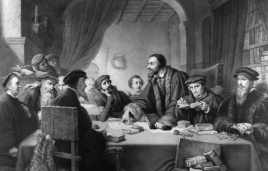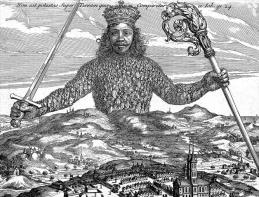Psychologist David Feldman writes:
…the tendency to blame the victim may be programmed into the human mind at a very basic level…(it) may originate, paradoxically, in a deep need to believe that the world is a good and just place…On some level, most of us believe that that the world is basically good, that good things happen to good people, and that we, fortunately, are good people. In other words, we believe the world is generally a just and fair place…Imagine how terrible life would seem if we truly thought the world was dangerous, unfair, and that we were not good people. Our positive beliefs help us to function and live happily in a world that can often be downright frightening.
…When bad things happen to someone who seems a lot like us, this threatens our belief that the world is a just place. If that person could fall victim to rape, assault, robbery, or attack, perhaps we could, too. So, to comfort ourselves in the face of this troubling realization and maintain our rosy worldview, we psychologically separate ourselves from the victim. We wonder if he or she had done something to invite the tragedy…
Perhaps victim blaming is a universal phenomenon, but psychologizing can also be a way of detaching ourselves from deeper issues. Our specifically American contempt for the poor is rooted in religion. It appears that very large numbers of Evangelicals (born-again or not), and to the extent that they define themselves as “sinners” (saved or not) do believe that “the world was dangerous, unfair, and that we were not good people.”
Indeed, the essence of conservative social philosophy (despite its superficial emphasis on freedom from the state) is that we live in a Hobbesian world in which life is “solitary, poor, nasty, brutish and short,” and that the only way to secure civil society is through universal submission to the absolute authority of a central government.
And the essence of both the proselytizing mind (which would convert non-believers) and the crusading mind (which would eliminate them entirely) is the projection of that inner sense of sinfulness out into the world and onto the “others” of the world.
John Calvin was the primary theoretician of Puritanism. He put a new emphasis on the very old doctrine of predestination that goes all the way back in Christianity to St. Augustine.
In a theology that only the rich could wholeheartedly approve of, the unknowable, transcendent deity had decreed long before that a tiny minority – the elect – were already saved. The vast majority would never rise above their sinful nature. One was either in a state of grace or not. “Therefore,” wrote Martin Luther, “We…deny free will altogether.” America’s foundation myth has enshrined these Pilgrims and Puritans as the first to settle the barren wilderness, even though other English settlers had arrived earlier (and Spaniards, of course, had arrived far earlier than they had). These people put a fundamental – and fundamentalist – stamp on American consciousness: human nature was utterly corrupt, and the only escape was through grace.
But they were never certain of salvation, however, so they experienced a constant anxiety that had been previously unknown in Catholicism. Their solution was to work unceasingly, hoping that grace would show itself through the results of the work ethic. Calvinism replaced the external order of the church with a far stricter internal order.
Never in history had so many people willingly imposed such restraints on themselves. Medieval peasants had created festivities as an escape from work, writes Barbara Ehrenreich, but “…the Puritan embraced work as an escape from terror.” Some believed in preparing themselves for the conversion experience that might prove their salvation, but only after utterly debasing their sense of self-worth. They were at war with the self yet unable to escape it.
One of their few respites from the weight of original sin was to project their sense of guilt onto others. So they effectively defined loss of self-control as the basis for all other sins, and their answer to the perceived disorder in the world was unrelenting discipline. Once converted, they turned their critical energies (which, we must always remember, they had formerly directed upon themselves) into converting those who still sinned – and failing in that attempt, to eliminate them. Others believed in free will but still emphasized individual responsibility. Either way, all worked relentlessly to glorify God, prove one’s state of grace and make a fallen world more holy.
In this fallen world, wealth distracted from life’s only purpose – glorifying God. When, however, one felt called to prove one’s state of salvation by acquiring wealth, such activity was acceptable – but only if one didn’t enjoy it. Here is the essential Puritan contradiction: work hard, get rich, spend little. They delayed their gratification, for rest would come only in the next world. Waste of time was sinful. A hundred years later, Benjamin Franklin advised everyone to become what we now call workaholics: “Be always ashamed to catch thyself idle.”
It is critically important for us in the 21st century to realize how profoundly these ideas still influence our attitudes toward wealth and poverty (as well as to sensuality). The strictly religious justifications have faded away, except in the Southern states, but the core of the ideas remains as strong in our national character as ever before.
As wealth became a sign of grace, poverty – for the first time – now indicated moral failure. Poor people were damned by nature. Furthermore, the rich were now justified in feeling only scorn for them. Since they were lazy and sinful, or they wouldn’t be poor (or enslaved), to be charitable merely encouraged idleness. It was a waste. Two hundred years later, Henry Ward Beecher wrote, “God has intended the great to be great and the little to be little.” Ministers commonly preached, “It is your duty to get rich,” and “To sympathize with a man whom God has punished for his sins…is to do wrong.”
Capitalism’s relentless logic eventually transformed this religious, if flawed, impulse into the secular concept of conspicuous consumption. By the second half of the 19th century, it allowed a few men to accumulate inconceivably vast fortunes. As I write in We Like to Watch: Being There with Trump, these “Robber Barons” were the first American generation to give themselves permission to flaunt their wealth. A hundred years later, James Baldwin cursed Ronald Reagan: What I really found unspeakable about the man was his contempt, his brutal contempt for the poor. Despite many exceptions, this uniquely American attitude still justifies official neglect because it has a religious foundation. The belief has long been established in the core of the American psyche.
Over three centuries, Americans gradually shifted from being producers to being consumers. They began by enshrining gain without pleasure and ended with addiction to “stuff.” But underneath the surface, work still equals salvation. It has been said that Europeans work to live, while Americans live to work. Journalist Lewis Lapham, however, argues that they misunderstand us:
…material objects serve as testimonials to the desired states of immateriality – not what the money buys but what the money says about our…standing in the company of the saved.
